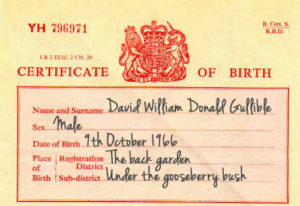Advanced Research

By now I hope you have read and digested the 'Where do I Start' page. Maybe you've also made a start and contacted some of your close relatives/family.
To further your research, the next stage is to visit the local archives or your nearest 'Family History Society'.
Archives may be sited within your local library, or may have their own building elsewhere. You should get information about this at the library.
However, The Family and Local History Handbook... (click the link to purchase a copy), lists many resources, including, registrars of Births; Marriages; and Deaths, record offices; archives and many more. In fact it could well be the best 10 pound's worth, that you ever spend on your hobby. It will be especially useful if your 'tree' has spread it's roots further than your local boundary!, as it covers the whole of the UK. It really is great value with it's 448 pages (current edition).
When visiting any archives or library research rooms, it is advisable to telephone first, to ensure there is a reader available, as these are sometimes limited in number. Phone numbers and other contact details, are in the aforementioned book. The last thing you want, is to be turned away, after travelling many miles to a record office.
Don't forget your 'pencil'. You will not be allowed to use a ball point pen. Or any other type of pen or marker.
You will find that the staff of the various research places, are very helpful. And they are quite used to having newcomers visit them. You will also discover that the same people are very knowledgeable, so don't be afraid to ask questions.
Many records, especially old parish records, will be on 'microfiche' or 'microfilm'. If you have never used a microfiche/film reader, don't worry as they are simple to use and the staff will show you what to do. There may also be some 'transcribed records' in booklet form. Please beware that these transcribed records can sometimes fall foul of the inevitable 'human error'. So always double check your records to be sure you have the correct one.
Another brilliant source of information these days (apart from the Internet) is the CD ROM. Many family history societies and some archives have CD ROMs for sale, with various records to choose from. My own local FHS 'Doncaster & District Family History Society' have many such CD ROMs. They are also available at the Doncaster Archives.
Another valuable source of information is to visit a Family History Fair! or Family History Society event. Especially if there is one near to an area where you are researching. Not only will you find lots of local information but you will meet local people with local knowledge, who may be able to point you in the right direction for your research in that area.
There is much more to learn about tracing your family tree. I hope I've given you the urge to follow it through. Believe me you'll love it!
Don't forget to check out our 'Research Links' for more invaluable information.
